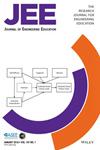“More conceptual than actual”: Epistemic metacognition in response to a non-numerical statics question
Abstract
Background
Metacognitive processes have been linked to the development of conceptual knowledge in STEM courses, but previous work has centered on the regulatory aspects of metacognition.
Purpose
We interrogated the relationship between epistemic metacognition and conceptual knowledge in engineering statics courses across six universities by asking students a difficult concept question with concurrent reflection prompts that elicited their metacognitive thinking.
Method
We used a mixed-methods design containing an embedded phase followed by an explanatory phase. This design allowed us to both prompt and measure student epistemic metacognition within the learning context. The embedded phase consisted of quantitative and qualitative analyses of student responses. The explanatory phase consisted of an analysis of six instructor interviews.
Results
Analysis of 267 student responses showed greater variation in students' epistemic metacognition than in their ability to answer correctly. Students used different kinds of epistemic metacognitive resources about the nature and origin of knowledge, epistemological forms, epistemological activities, and stances toward knowledge. These resources generally assembled into one of two frames: a constructed knowledge framing valuing conceptual knowledge and sense-making, and an authoritative knowledge framing foregrounding numerical, algorithmic problem-solving. All six instructors interviewed described resources that align with both frames, and none explicitly considered student epistemic metacognition.
Conclusions
Instructors' explicit attention to epistemic metacognition can potentially shift students to more productive frames for engineering learning. Findings here also inform two broader issues in STEM instruction: student resistance to active learning, and the direct instruction versus inquiry-based learning debate.

 求助内容:
求助内容: 应助结果提醒方式:
应助结果提醒方式:


